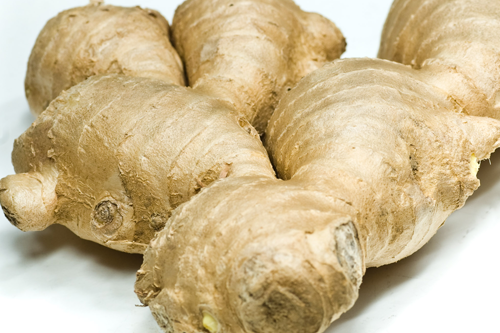
Fragrant, impactful and fiery, ginger includes a unique flavor and pizzazz to Asian-style stir fries and many vegetable and fruit dishes. Crisp ginger root is accessible year round in the produce area of your nearby market. Personally, it’s a favorite, and most used ingredient in my dishes. I also use it in teas, and with my morning juicing.
Natural Remedy
Ginger is a spice that has traditionally been treated as medicine in both Traditional Chinese Medicine and Ayurveda, doses of 1-3g can reduce nausea and ease digestion quite effectively; super loading the powdered rhizome (vertical root) at 10-15g daily might increase Testosterone.
Health Benefits
Ginger is traditionally known as the stomach ache remedy. It has long been known to help alleviate gastrointestinal distress by helping relax and sooth the GI tract. In addition, it helps reduce nausea and vomiting. The anti-inflammatory compounds, gingerols, are the reason those suffering from arthritic conditions have felt some type of pain relief. To top it off, studies are now showing ginger to have anti-cancer properties and other immune-boosting and detoxification benefits. Ginger does contain numerous other anti-inflammatory and antioxidant compounds beneficial to health such as gingerols, beta-carotene, capsaicin, caffeic acid, curcumin and salicylate. Mature ginger will have a tougher skin that will require peeling before blasting, but younger ginger (usually only found at Asian markets) can be left intact.
When possible, choose fresh ginger over dried to get higher levels of gingerol and its anti-inflammatory compounds. Make sure the ginger root is firm, smooth, and absent of mold. Ginger is also available in dried form as well as crystallized, candied and pickled. You may keep fresh ginger, unpeeled in the refrigerator for up to three weeks or in the freezer for up to six months.
How to incorporate more ginger into your diet
Ginger pairs well with many different types of seafood, oranges, melon, pork, pumpkin and apples. When buying fresh ginger, look for a root with smooth, taut skin (no wrinkles) and a spicy aroma. Store fresh ginger in a tightly wrapped plastic bag in the refrigerator or freezer. Fresh ginger should be peeled and grated before use. In most recipes, one-eighth teaspoon of ground ginger can be substituted for one tablespoon of fresh grated ginger. Ground ginger can be found in the herbs and spices section of most grocery stores.

Ginger Peach Smoothie See Recipe Here
Add fresh ginger into your next smoothie or juiceQuick tips:
- Add fresh or dried ginger to your next stir-fry or homemade salad dressing
- Steep peeled fresh ginger in boiling water to make your own ginger tea
- Use fresh or dried ginger to spice up any fish recipe
Ginger provides a variety of vitamins and minerals:
-
Carbohydrate – 17.77 g
-
Dietary Fiber – 2 g
-
Protein – 1.82 g
-
Dietary Fiber – 2 g
-
Sugars – 1.7 g
-
Sodium – 13 mg
-
Vitamin B6 – 0.16 mg
-
Calcium – 16 mg
-
Iron – 0.6 mg
-
Vitamin C – 5 mg
-
Potassium – 415 mg
-
Magnesium – 43 mg
-
Phosphorus – 34 mg
-
Zinc – 0.34 mg
-
Folate – 11 mcg
-
Riboflavin – 0.034 mg
-
Niacin – 0.75 mg
-
Iron – 0.6 mg
Figures above are per 100g of ginger.
